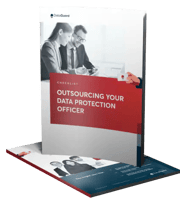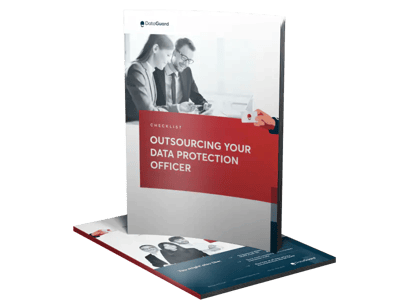Before May 2018, it was assumed that any organisation was compliant with data protection laws unless non-compliance was identified through evidence or an investigation.
With the current data privacy regulations, it is the responsibility of an organisation to prove that they are compliant with relevant, applicable EU and host nation data privacy law(s).
Under relevant data privacy regulations such as the GDPR or other applicable host nation data privacy laws , regulators can fine companies that do not meet the respective criteria up to 20 million EUR / 17.5 million GBP or 4% of a company's global revenue – whichever is greater (Article 83 para. 5 GDPR).
Article 37 of the GDPR requires that some organisations appoint a DPO (data protection officer) to monitor and assess the company's data compliance. However, many companies are also opting for an outsourced DPO to profit from its benefits.
In this article, we will explain which outsourced DPO services are available and why opting to outsource your DPO can be a real asset for your organisation.
In this article:
- What is a Data Protection Officer?
- What is an outsourced Data Protection Officer?
- Benefits of outsourcing your DPO
- Questions to ask when hiring an external DPO
What is a Data Protection Officer?
A data protection officer (DPO) is responsible for overseeing a company's data protection mandate and strategy. Especially if you have a large company, this can be a mammoth task, often meaning you will need to create a job role solely for this responsibility.
A DPO's job is to advise and work with a company towards meeting the existing requirements of the relevant data privacy regulations. If your company handles, processes, or stores customer data, then it's likely you will need an appointed DPO to manage your compliance.
In the context of a mandatory DPO designation, the GDPR language and terminology don't focus on the size of an organisation, but instead on the size and scope, nature, context and purpose of data handling.
The four key factors that are assessed are:
- Length of data retention
- Data items
- Data subjects
- Geographic range
A data protection officer's job can involve a wide range of responsibilities. This includes educating staff, conducting audits, and managing comprehensive records.
What is an Outsourced Data Protection Officer?
Many companies decide to outsource their DPO instead of hiring an in-house data protection officer. This works by employing an expert team of security and privacy consultants who can work with you towards data compliance.
They can recommend and implement data strategies whilst training your existing employees. It can be a great way to access industry experts without having to hire them as full-time employees.
Outsourcing your data protection officer is simple and straightforward to do. You can rely on their expertise and experience in the data protection field and have regular and consistent interactions with them, despite them being outsourced.
The Benefits of Outsourcing Your DPO
There are many reasons why it can be beneficial to outsource your DPO. Take a look at the following list to find out why outsourcing DPO can be an asset to any business.
-
Improve Your Cost-Efficiency
The hiring process can be tedious and time-consuming whilst also diverting attention from your other staff. If you are looking at hiring an in-house DPO, this can be a costly process, especially having to train a DPO on your company's regulations and policies.
Internal DPOs also tend to be tricky to retain as they're always being offered other opportunities. This is due to their unique and mandatory status in businesses across all industries. Once an internal DPO leaves, the hiring process will have to start all over again.
By choosing an outsourced DPO, you'll save money in the long run, allowing you to work consistently with the same industry-specific experts.
-
Minimise Your Own Liability and Risks
An internal DPO is subject to special protection against dismissal under current regulations. An external DPO will prevent any liability and risks by giving clear recommendations and practical support.
Any reputable DPO company that offers data protection officer outsourcing in the UK should have liability cover, giving you peace of mind in regard to risk.
-
Maximise Productivity
Any appointed internal DPO will have to continually access and undergo additional training in DPO areas and niches. This will cost a considerable amount of money and time to make sure they are up to speed with the relevant regulations.
If you have an employee covering two job responsibilities including being a DPO, this also detracts from their other responsibilities. Their overall productivity within your company will then likely suffer as a result.
Hiring an external DPO specialist allows your employees to focus on their daily tasks and schedule.
-
Accessing Industry Experts
Finding a person who is trained in the right DPO skillset and with the correct industry-specific knowledge is no easy job. This is especially true given that GDPR regulations are always changing.
By working with an outsourced DPO team, you're able to access specialist privacy-trained lawyers and IT security experts who are leaders in the GDPR field.
There's nothing about GDPR that they don't know. Working with an outsourced GDPR team means you get/can access industry expert knowledge, without having to employ/hire a full-time staff member/employee.
-
Satisfy Independent Requirements
Conflicts of interest can quickly arise when using an in-house DPO. If this employee has a personal affinity with the company, this can sometimes lead to GDPR non-compliance and the risk of being fined.
An external data protection officer has no personal investment in the company they are overseeing, meaning the data compliance will be impartial and independent.
The GDPR states that a DPO needs to act independently of a company and not be restricted from tasks or duties. An outsourced DPO is the best way to ensure neutrality and impartiality in this process.
Questions to Ask When Hiring an External DPO
If you're thinking that an external DPO company is the best for your business and its data compliance, you need to know the right questions to ask.
Some DPO companies will not have the same level of expertise as others. These 11 questions can help with letting you work out which external DPO is the best company for the job.
-
What value will you add to my organisation?
A reliable external DPO company will be able to clearly state what they can offer to a business and give comprehensive evidence to back this up. -
How will you add value to my organisation?
This is where a DPO company needs to show what changes and strategies it will implement. A clear plan of action should be developed and ready to go after an initial consultation. -
How do you stay up to date on recent changes in technology and the law?
Look for them referencing any new or recent developments in the GDPR sector. How current is their knowledge? Are they using up to date technology and cyber security methods in their packages? -
Will I have a designated contact? And how will you match us?
It's important you have a consistent and easily accessible point of contact who knows your company and its data regulations inside-out. The last thing you want is to have no clear line of communication. -
What industry-specific knowledge do you have about the sector I work in?
You want an external DPO to know about your industry and the data challenges you face. Are they using the correct terminology? Do they understand how the industry operates? -
What are some of the privacy challenges you've encountered for a business like mine?
Clear examples of the privacy and data challenges within your sector are helpful. What did they do to overcome them? Were they able to find a suitable resolution? -
What experience do you have in disaster recovery?
Can they keep a cool head when the worst happens? What did they do to navigate these situations? -
What types of qualifications do your privacy experts hold?
Ideally, you'll want an external DPO team with a mixture of privacy-trained lawyers and IT security experts. -
How do your audits for data privacy work? And what is the timescale on them?
A good external DPO team will have a designated audit structure. After assessing the scale of your business and data interaction, they should be able to give a reasonable timescale estimate. -
How do you keep your TOMs, RPAs, and privacy policies up to date?
A decent external DPO should have an impeccable privacy policy as well as be fully up to date with their TOMs and RPAs. -
What's included in your consultation hours? And what isn't included?
It's helpful to have a clear distinction between what services you can expect from an external DPO and if there's anything that you might need to pay extra for.
Outsourced DPO: Take the Next Step for Your Business Today
Choosing to invest in an outsourced DPO can give companies the confidence and infrastructure to be fully GDPR compliant without fear of repercussions. Take a look at our whitepaper downloads if you'd like more information on outsourced DPO and GDPR compliance.
Working with customers' personal data can prove to be a real privacy challenge if you don't have the knowledge or experience.
Expert outsourced DPO services in the UK are simply a click away. Register your interest in outsourcing DPO with our team today.


Thinking of hiring an external Data Protection Officer?
Find the right fit for your business.
Get your free guide






